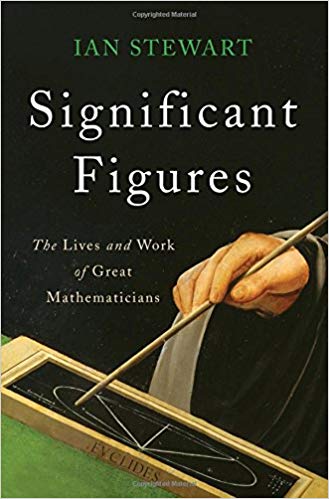
Significant Figures: The Lives and Work of Great Mathematicians
Tom Verde
Ian Stewart
2017, Basic Books, 978-0-46509613-8, $16.99 hb.
This book will fascinate readers with even a passing interest in mathematics. Among the “top 25” mathematical pioneers profiled, Muhammad ibn Musa al-Khwarizmi (c. 780–c. 850) will stand out. “[W]hat is easiest and most useful in arithmetic” for resolving legal, commercial and engineering difficulties, al-Khwarizmi pondered in his landmark al-Kitab al-mukhtaser fi hisab al-jabr wa-l-muqabala (The Compendious Book on Calculation by Completion and Balancing), written around 830. His answer, identified in the title, was al-jabr, “completion,” later Anglicized to “algebra,” a method he devised to find unknown quantities in what are now familiar, x-and-y equations. And while he was at it, he “almost singlehandedly” introduced medieval Europe to “Hindu numerals”—including the hitherto unknown zero—which ultimately led to “Algoritmi” or algorithms, a term derived from his Westernized name (Algorismi).
You may also be interested in...

Archaeology and Geology of Ancient Egyptian Stones—Book Review
In categorizing the stones the ancient Egyptians used, author James A. Harrell unites geology, archeology and cultural history in one monumental reference..png?cx=0.44&cy=0.65&cw=382&ch=487.6595744680851)
Zeina Abirached’s Art Uncovers Urgency of Wisdom in Gibran’s The Prophet
Kahlil Gibran’s 1923 classic is given new life, as Abirached’s graphic novel blends Lebanese artistry with the late author’s timeless wisdom.